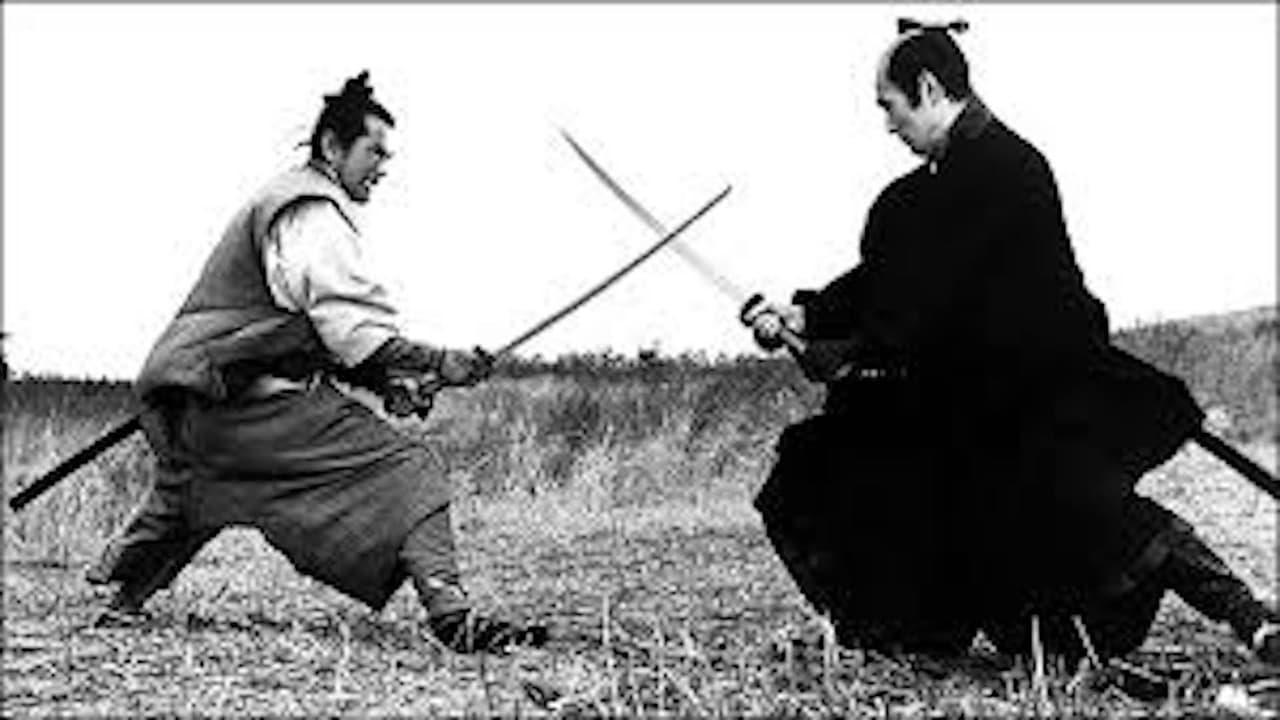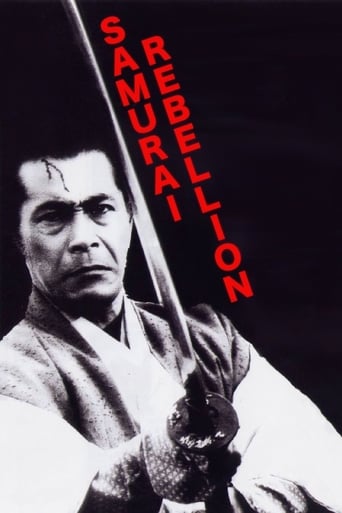

Set in 1725 Japan, and made in 1967, isn't it interesting that this film reveals so many universal truths? Difficulties in marriage. The feeling in middle-age that comes when looking back at decisions and events in one's life. The need to stand up for what's right, despite a world that sometimes crushes us so unfairly. At the same time, the movie is distinctly Japanese. There are so many great shots from Director Masaki Kobayashi and cinematographer Kazuo Yamada, including such harmonious placement of people and objects in 'small' moments, that they're almost as if they were Zen rock gardens of their own. There are also of course the big scenes, such as the epic samurai showdown as the wind blows through the wild grass, which is amazing. Toshiro Mifune turns in a memorable performance, and leads an excellent cast. The soundtrack, with music provided by Tōru Takemitsu, fits the scenes and emotions beautifully. There is an undercurrent of defiance running through the movie, from Mifune's outspoken wife (Michiko Ôtsuka) to his son (Go Kato) and daughter-in-law (Yoko Tsukasa) clinging to one another despite cruelty from the local feudal lord. Mifune is calm as he braces for battle exclaims "I, in all my life, have never felt more alive than I do now", and we feel for the honor, for the rightness, of what he's about to do. Great film.
... View Moregood movie, recommendedthe story is that of a concubine of a Japanese lord who after giving this an heir is denied and given in marriage to repair a young samurai from a small family.despite the reluctance of the mother and the initial suspicion of her father, the couple create a strong union and conceive a daughter. throughout the union and the feelings of the couple, however, were described to me better, because despite being one of the most important points of the film is analyzed shortly . the father (played by a consistently great Toshiro Mifune) is struck by the love that binds the two young and decides to commit to defend the union from the lord of the manor that after a few years back the claims .I must say that the film develops slowly, the story is well told. actors have a very formal acting and theatrical mold, as usual in Japanese cinema .are mentioned some thoughts on Japanese society of the time, such as the position of women, but more than a critique would call a gash on Japan at the time of the shogunate.in short, good movie, good actors 7/10
... View More"The Greatest Evil is when Good Men do nothing in the face of Injustice..." SAMURAI REBELLION (1967) is directed by Masaki Kobayashi, the same director responsible for the awesome KWAIDAN and the far superior samurai film "Hara-Kiri". Don't get me wrong, this film is a true emotional achievement by Kobayashi, the drama and intense screenplay is magnificent that even the awesome swordplay displayed on screen seemed utterly unnecessary. "Samurai Rebellion" is a stunning masterpiece in Japanese cinema, originally titled Joiuchi Hairyo tsuma Shimatsu (Rebellion, Receive the Wife) is a tale of righteous rebellion to protect a husband and his wife's honor.Peacetime. A retainer in the Matsudaira clan named Isaburo Sasahara (Toshiro Mifune) is a retiring samurai who seeks a wife for his son Yogoro (Go Kato). However, his Clan Lord orders him to have his son marry a woman named Ichi (Yoko Tsukasa). She is the Lord's mistress and she has just given birth to his son. Ichi has caused a scandal and has been dismissed from the castle for striking Lord Matsudaira. Isaburo refuses to the union until the son himself agrees to the marriage. Surprisingly, Ichi proves to be a worthy wife; she and Yogoro get along famously and she bears him a daughter. Then the unexpected happens, Matsudaira's heir dies, which makes Ichi's son the heir apparent. Matsudaira decides to forgive Ichi for striking him and requests her return to his castle, since the mother of the heir cannot be married to a vassal. Ichi refuses and decides to stay married to Yogoro. Ruin may come to the house of Sasahara as Isaburo and his son decides to disobey; the Azu clan has gone too far.The film is a stunning portrayal of righteousness in the face of injustice. The film effectively explores the social impact of rebellion in the midst of a totalitarian excesses in the Edo Period in Japan as well as the domestic tragedy of the honorable men and the wife who precipitated the events. As in "Hara-Kiri", Kobayashi gives a very bleak view of the political and social injustices committed by self-indulgent authority figures. Kobayashi further delves into the emotional expression of similar themes about family and honor. The main characters are victims of fate, and the lead characters stand tall in their righteous indignations. Even Isaburo's close friend; Tatewaki Asano (played by Tatsuya Nakadai, Hara-Kiri, Sword of Doom) is also a victim of his principles and fate. Tatewaki was instructed to engage Isaburo in combat since he is the only one who may be able to defeat him in a duel, and as much as he tries to stall the inevitable encounter, he ends up crossing swords with his old friend nonetheless.Ichi is the most interesting female character I've ever come across in chambara films. She is strong-willed and while she did give in to Matsudaira's orders before, she is unmoved to suffer the same injustice a second time. Pressured by relatives to avoid the ruin of the Sasahara family, the woman is such a sight to behold; she outshines the heroism of the two men bent on defending her. Most classic chambara films portray Japanese women as a demure, obedient and ideal wives, and while Ichi's character are all those things; Yoko Tsukasa's devastating performance has created a character far stronger than the all the males around her; this includes her husband, played by Go Sato and her father-in-law, played by Toshiro Mifune.Toshiro Mifune's character, Isaburo is a master swordsman, whose skills have earned him the position of weapons keeper in the clan. While he did marry his wife out for the sake of social status, never for one moment that his character felt weak. Quite curious that this past may have contributed to the reasons as to why the father would support his son's decisions to disobey their lord. For him, love is a cause worth fighting for, even if it would mean his family's ruin. Yogoro is a man divided in doing his duty to his lord and to his wife, Go Kato bears his soul in his portrayal though his screen time may be limited. The actor efficiently and effectively shows all the needed emotions that an overwhelmed husband would feel.While I did say that the film didn't need any swordplay to emulate the darkness and intensity of the proceedings, we get it anyway. Toshiro Mifune once again proves why he is among the most loved actors to ever play a samurai warrior. The swordplay is realistic and intense, and follows the choreography that we have been privy to in past samurai films. Adding the strong exclamation point brought about by the duel with his Tatsuya Nakadai, the film satisfies those looking for swordplay action. Which also brings us to the film's one possible very minor fault, the bloodshed near the climax seemed a bit pointless, since the dilemma is over but I suppose the screenplay by Hashimoto Shinobu wanted to end the film with an exciting element for international audiences. (The title has been changed to fit international marketing)In Samurai Rebellion, director Kobayashi has taken his character study of individuals pushed against their emotional tolerances to the absolute limit. He successfully overcomes the stereotype that samurai films are composed of manly swordfights and has given new emphasis on the strengths of the Japanese woman and the aspects of family. In doing so, he has widened his scope and elevated the film's emotional potential.
... View MoreIsaburo Sasahara is a former samurai warrior and master swordsman who now lives a quiet life as head of his family, he has been continually henpecked by his wife for all their married life, so its his ambition to have his eldest son Yogoro married to a woman who will respect him. Isaburo's plan is thrown into disarray however, when he receives a notification from the Lord of the Aizu clan, that he would like Yogoro to marry Lady Ichi, a mistress of his who has fallen out of favour. This in itself seems rather insulting to Isaburo, as Lady Ichi he learns has a reputation of being violent towards his lordship and added to that she has an illegitimate child by him. After much family discussion they all agree that to refuse his lordship's offer would mean certain ruin for the Sasahara family, so they agree. Much to their surprise Lady Ichi is a kind, affectionate, helpful and thoroughly pleasant woman. She regales them with tales of his lordships cruelty and adulteress behaviour, the family are pleased she has finally found happiness with Yogoro.Yogoro and Ichi are blessed with a child, that helps Ichi forget she had to give up her first child, as it was second in line to his lordships domain. However after the heir dies, Yogoro now head of the family receives another request, that Ichi should return again, as her son is now heir and it wouldn't be fitting for the mother of an heir not to be with her child.This however is the final straw and Isaburo and Yogoro set out to defy their lord and fight for their rights.Samurai Rebellion was Masaki Kobayashi's first foray into the field of independent films and he returned to a familiar theme (previously used in Harakiri,1962) of injustice perpetrated by a tyrannical authority figure. Kobayashi teamed up with legendary Toho studios and Mifune Productions to recreate the literary vision of Yasuhiko Takiguchi's "Hairyo tsuma shiatsu" in a script by Shinobu Hashimoto. The films original title literally translated as Rebellion: Receive the Wife was changed for western audiences at the request of Toho, as they didn't believe it sounded manly enough for a Western audience that were very keen on Samurai films. Despite its more familiar title, this is very much a family drama, that wonderfully builds up its characters and to label it as a Samurai or action film would be erroneous, the rebellion scenes occurring only as we near the finale. Kobayashi's also uses Japanese architecture and symmetry to further the mood, using pillars, castle walls, doors, protective eaves and endless straight lines to promote stability, when the Sasahara family are having a less than unified debate on their predicament, the members are all stationed at unusual differing distances from the camera making the harmonious composition appear unsymmetrical when a member leaves the room and also towards the end of the film Isaburo and Yogoro remove all elements of geometric stability from their home as they await the arrival of their feudal lords men, their act seemingly to once and for all end their association with their restraining dogmatic social structures.The performances are all superb, Mifune giving us one of his more retrained performances with only glimpses of his more familiar gusto as he emotes and reflects on the tragedy of the situation his family is in. The great Tatsuya Nadakai is restricted to a few brief scenes, but his power still shines through. Yôko Tsukasa and Go Kato also produce memorable performances as the loving couple willing to die to retain their partnership. Samurai Rebellion is a powerful film that reflects its directors concerns with the abuse of authority, it exudes class and visual style and its attention to detail is second to none. As a film it can't be faulted.
... View More